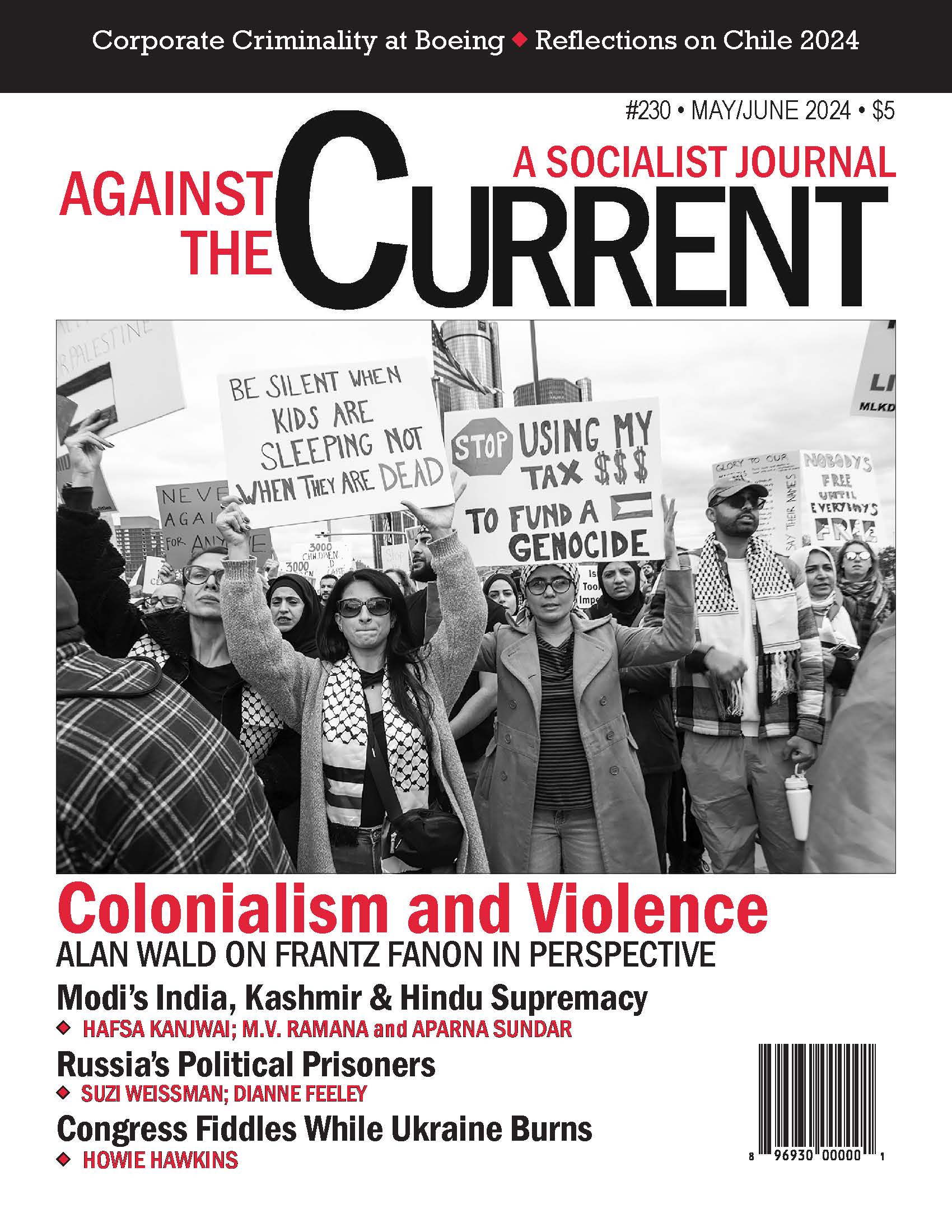Against the Current No. 230, May/June 2024
-
Chaos Here and There
— The Editors -
After Roe, the Anti-Abortion Duluge
— Dianne Feeley - Demanding Bodily Autonomy
-
Profits Trump Public Safety
— Malik Miah -
Solidarity Stronger Than Repression: The Case of Boris Kagarlitsky
— Suzi Weissman -
The Case of Oleg Orlov
— Dianne Feeley -
Then & Now: Reflections on Chile
— Oscar Mendoza -
Kashmir Today, Part 1
— Hafsa Kanjwal interviewed by Salik Basharat Geelani & Yuliia Kulish -
The Long Reach of Hindutva
— M.V. Ramana & Aparna Sundar -
"The Day After" Fading to Oblivion?
— David Finkel -
Congress Fiddles While Ukraine Burns
— Howie Hawkins - Review Essay
-
Frantz Fanon and the Paradox of Anticolonial Violence
— Alan Wald - Reviews
-
Innovatively Stretching Marxism
— Dianne Feeley -
Fascism As It Is Now
— Bill V. Mullen -
Was Hamas Contained?
— Samuel Farber -
Glamor, Amnesia and Bisexual Angst
— Peter Drucker -
Barbie: Icon, Movie, Industry
— Frann Michel
Dianne Feeley

SIMILAR TO THE case of Boris Kargarlitsky, Oleg Orlov was convicted in 2023. Last October Olov, co-founder of the now-banned human rights group Memorial, was found guilty of violating Russia’s law against “discrediting the armed forces.”
Orlov, had written an antiwar essay, “They Wanted Fascism, and That’s What They Got.” His essay was first published in French by Mediapart in November 2022; he later posted it in Russia on his Facebook page. He denounced Putin’s invasion of Ukraine, calling it “mass murder,” writing:
“Now cracks a noble heart. Good night sweet prince: And flights of angels sing thee to thy rest! The brutal war unleashed by Putin’s regime in Ukraine is not only mass murder of people and destruction of the infrastructure, economy, and cultural sites of this wonderful country. It is not only the destruction of the foundations of international law. It is also a severe blow to the future of Russia…. The country, which moved away from communist totalitarianism thirty years ago, is now pushed back into totalitarianism, but this time into a fascist totalitarianism.”
Orlov’s conviction resulted in a 150,000 rubble fine (roughly $1,630). He maintained his innocence of the charges and refused to express regret over the essay. Just two weeks later state prosecutors filed for a retrial, claiming that the case had missed the “political and ideological hatred” motive that was the basis for his article. He was declared a “foreign agent” at the end of January.
Since 1988 Orlov has been active in defense of political prisoners and an observer in conflict zones. In mid-1995 he was part of a delegation that resolved a hostage crisis in Budyonnovsk. Along with others, he became a volunteer hostage in order to guarantee an exchange of prisoners with Chechen separatists. As a result of this compromise, Russia agreed to halt military actions in Chechnya and begin negotiations. However, this turning point for the First Chechen War hit a dead end as peace talks broke down. Putin later initiated a Second Chechen War.
Memorial was founded during the fall of the Soviet Union to study the human rights violations of Stalin’s era. Its mission was later expanded to not only research the entire Soviet period but also to protect human rights in today’s Russia. It came under more scrutiny after the Russian “foreign agent” law was passed in 2012. Two years later its center was declared a “foreign agent” by the Ministry of Justice. In December 2021, the center was ordered shut and its property liquidated by the Moscow City Court. State prosecutors had accused it of supporting terrorism and extremism.
Between 2004 and 2022 the Memorial Human Rights Centre has received numerous human rights awards. Along with organizations in Belarus and Ukraine, Memorial was awarded the 2022 Nobel Peace Prize.
The Second Trial
Throughout the February 2024 retrial Oleg Orlov spent his time sitting in the courtroom, reading Franz Kafka’s The Trial. He refused to answer questions throughout the four days. His lawyer Katerina Tertukhina challenged the premise of a retrial, noting that prosecutors refused to specify where the essay discredited the Russian military.
Two members of the pro-Kremlin “Veterans of Russia” movement, Vadim Mironenko and Sergey Bokhonko, who first brought the charges against Orlov, testified at the second trial. Mironenko said he’d been following Memorial’s work and found it “criminal and destructive.” When Orlov declined to question him, Mironenko responded by accusing Orlov of bragging about his negotiating skills in the Budyonnovsk crisis and claiming that Orlov worked “to spare” terrorists who later carried out attacks.
But the prosecution’s key witness, Maria Zueva, who supposedly conducted the updated linguistic examination of the essay, turned out to be a trainee with no previous experience.
The prosecutor’s summary maintained that Orlov did more than share his personal opinions. The defense lawyer made mincemeat of that argument, pointing out that the charge was “cultivating a false opinion” about the Russian military. Tertukhina argued, “But what’s the threat in forming a false opinion? And how can an opinion even be false? It simply exists or it doesn’t.”
Oleg Orlov made a closing statement, despite his original thought about forgoing it. Given Alexey Navalny’s recent death, he explained:
“But then I thought about how these are all links in one chain, the death, or more precisely, the murder of Alexey, judicial persecutions of other critics of the regime (including mine), the suffocation of freedom in this country, and Russian troops invading Ukraine. And so I decided to speak up, after all.”
He remarked that since putting his article up on Facebook, events have only confirmed the issues he raised in his essay: “It’s perfectly clear now that I didn’t exaggerate one bit.”
Then Judge Elena Astakhova sentenced Orlov to two-and-a-half years in prison for “discrediting” the Russian army. He was immediately taken away by masked police officers as supporters in the hallway shouted, “We love you!”
May-June 2024, ATC 230

